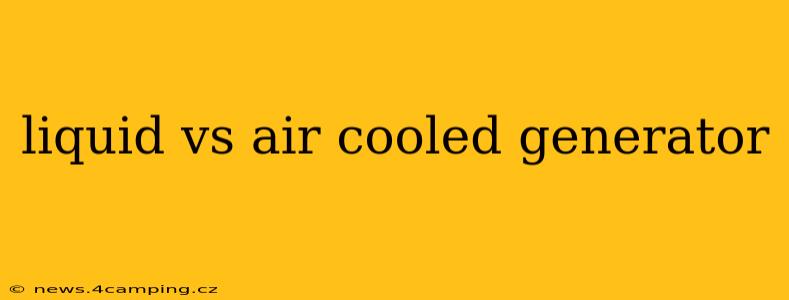Choosing between a liquid-cooled and an air-cooled generator can feel overwhelming. Both types power homes, businesses, and industrial sites, but their designs and performance characteristics differ significantly, impacting efficiency, lifespan, and overall cost. This comprehensive guide will dissect the key differences, helping you make an informed decision.
What is a Liquid-Cooled Generator?
Liquid-cooled generators use a coolant, typically a mixture of water and antifreeze, to regulate the engine's temperature. This coolant circulates through a system of channels within the engine block, absorbing heat generated during operation. The heated coolant then flows to a radiator where a fan dissipates the heat into the surrounding air. This system allows for more efficient heat transfer than air cooling, enabling the generator to operate at higher loads and for extended periods.
What is an Air-Cooled Generator?
Air-cooled generators rely on the natural convection and forced airflow to dissipate heat. A fan pulls ambient air over the engine's fins, allowing heat to radiate away. While simpler and often less expensive initially, this method is less efficient at transferring heat, particularly under heavy loads. This can lead to overheating if not properly managed.
Liquid Cooled vs. Air Cooled: Key Differences
Here's a detailed comparison highlighting the core distinctions between liquid and air-cooled generators:
| Feature | Liquid-Cooled Generator | Air-Cooled Generator |
|---|---|---|
| Cooling Efficiency | Higher | Lower |
| Heat Dissipation | More effective, even under heavy loads | Less effective, prone to overheating under load |
| Operating Temperature | Can operate at higher temperatures | Limited by operating temperature |
| Engine Life | Generally longer | Potentially shorter, depending on usage |
| Maintenance | Requires coolant checks and occasional flushes | Typically less maintenance |
| Noise Level | Often quieter due to less intense fan operation | Can be noisier due to higher fan speeds |
| Cost | Typically more expensive upfront | Generally less expensive upfront |
| Size & Weight | Usually larger and heavier | Usually smaller and lighter |
| Fuel Consumption | Can be slightly more fuel-efficient at high loads | Can be less fuel-efficient at high loads |
Which Type of Generator is More Efficient?
Liquid-cooled generators are generally more efficient, especially at higher loads and extended run times. The superior heat dissipation allows the engine to operate at optimal temperatures, leading to better fuel efficiency and longer engine life. Air-cooled generators, while simpler, can suffer from reduced efficiency under stress due to overheating.
Which Type of Generator is Quieter?
Liquid-cooled generators often operate more quietly. Because they can manage heat more effectively, the cooling fan doesn't need to run at such high speeds, resulting in a quieter operation. Air-cooled generators, relying heavily on forced air cooling, can be noticeably louder.
How Long Do Liquid Cooled Generators Last?
With proper maintenance, liquid-cooled generators typically boast a longer lifespan than their air-cooled counterparts. The consistent temperature control minimizes wear and tear on engine components, extending their operational life.
Which Type of Generator is Best for Home Use?
The best choice for home use depends on specific needs and budget. For occasional use or smaller power requirements, an air-cooled generator may suffice. However, for frequent use, larger power demands, or extended runtime, a liquid-cooled generator offers superior performance and reliability.
What are the Maintenance Requirements for Each Type?
Both types require regular maintenance, but the specifics differ. Liquid-cooled generators need periodic coolant checks, flushes, and inspections of the cooling system. Air-cooled generators require regular cleaning of the cooling fins to ensure proper airflow.
What is the Difference in Price Between Liquid Cooled and Air Cooled Generators?
Liquid-cooled generators typically command a higher upfront cost due to the more complex cooling system. Air-cooled generators are generally less expensive initially. However, the long-term cost savings from increased lifespan and efficiency of a liquid-cooled system should be considered.
This detailed comparison should empower you to choose the generator that best suits your power needs and budget. Remember to consider factors like frequency of use, power demands, budget, and desired noise levels when making your decision.
